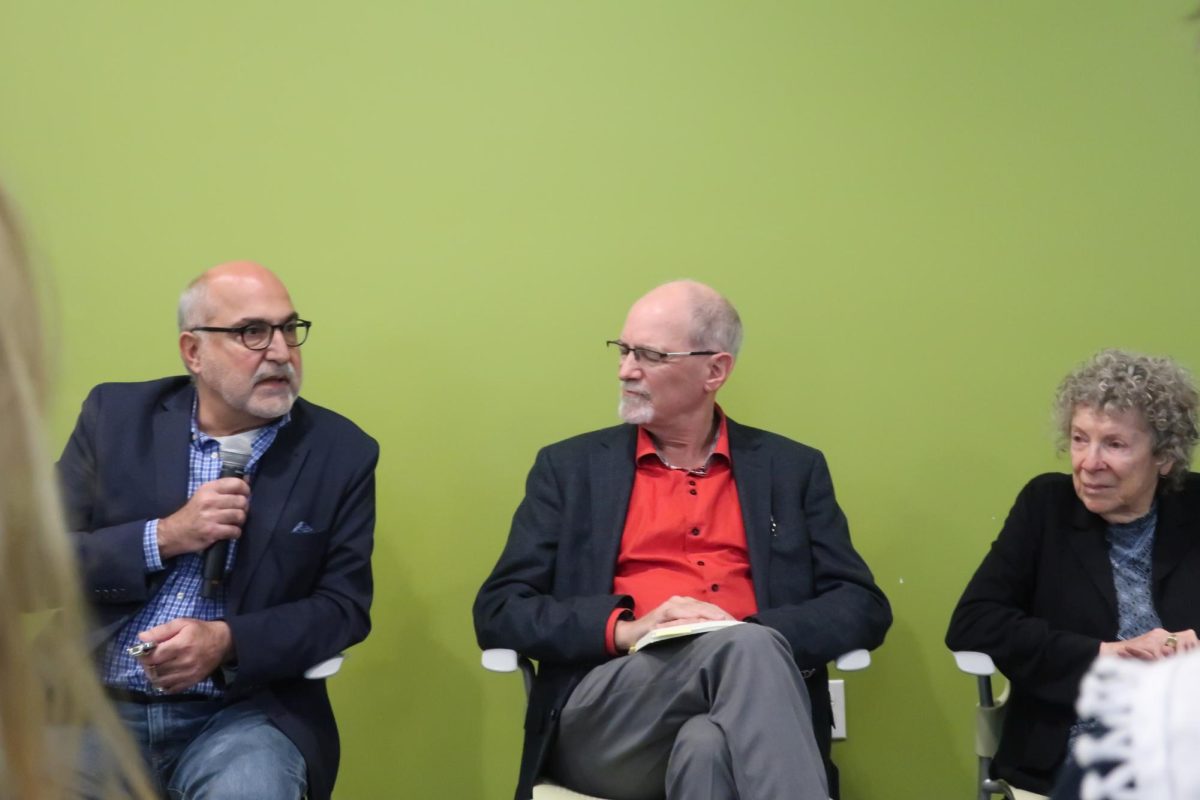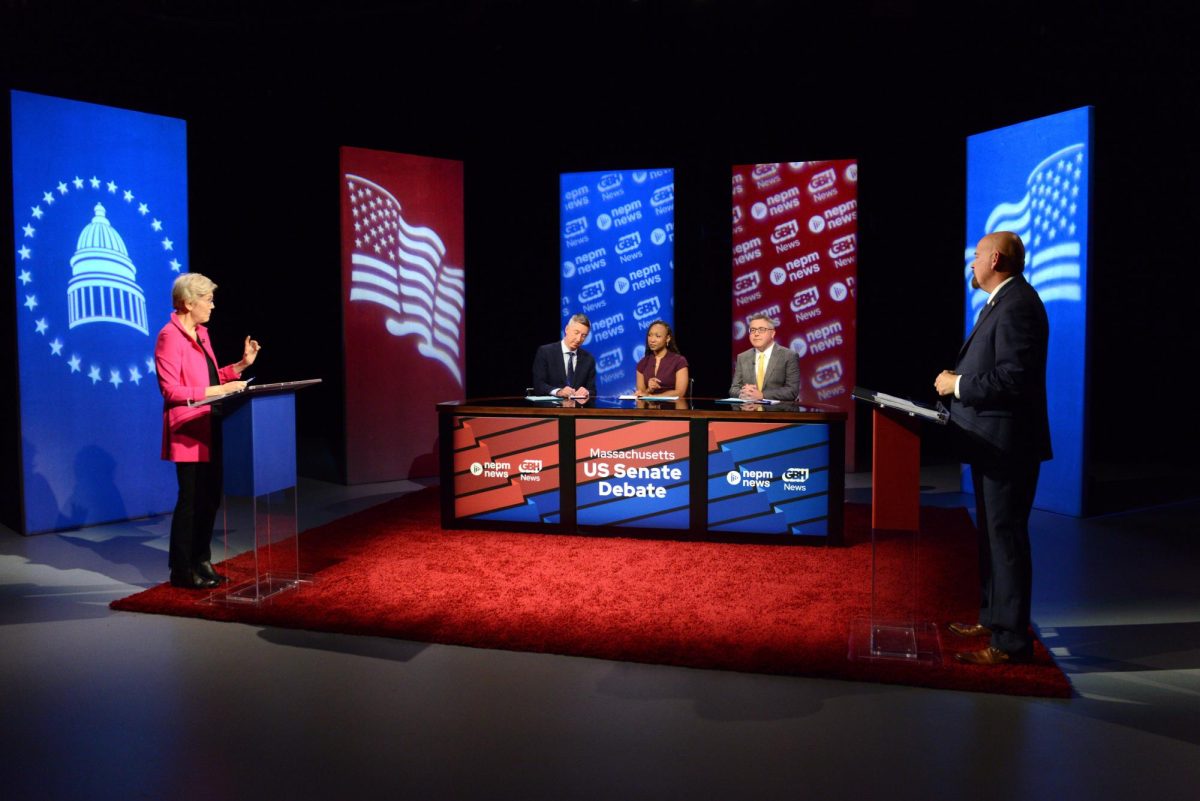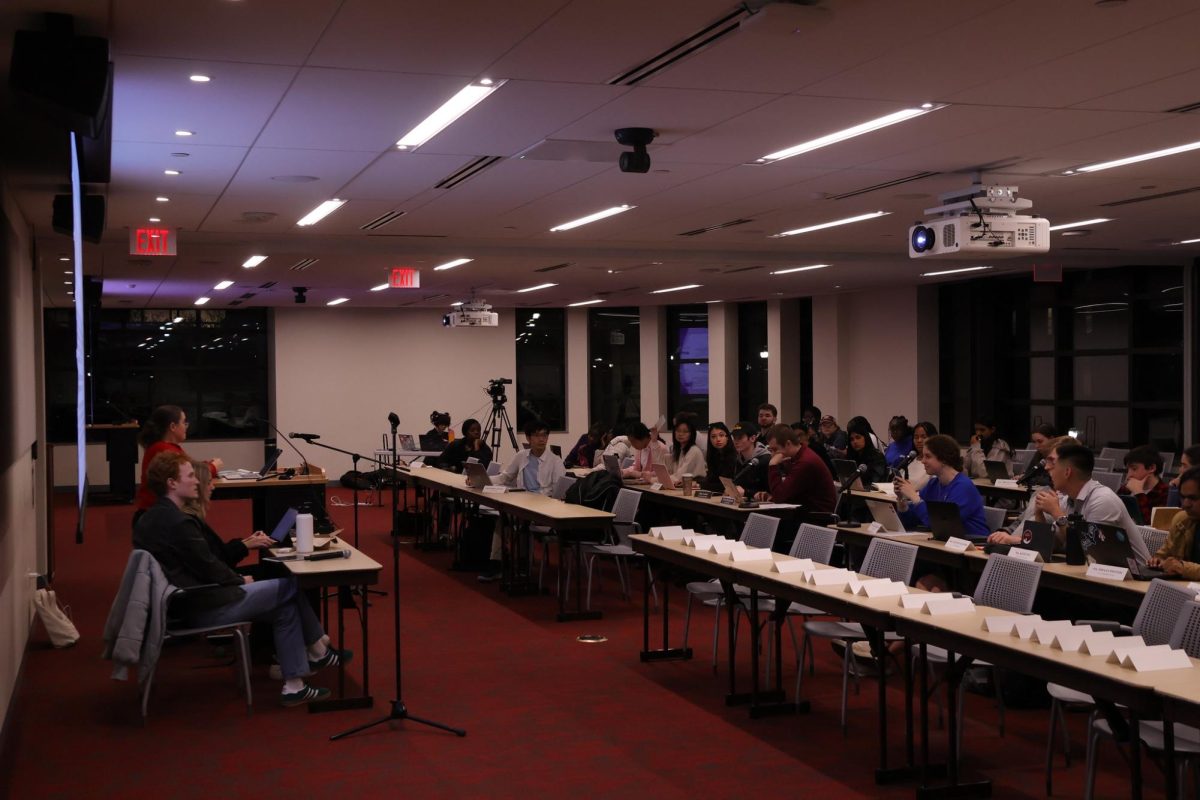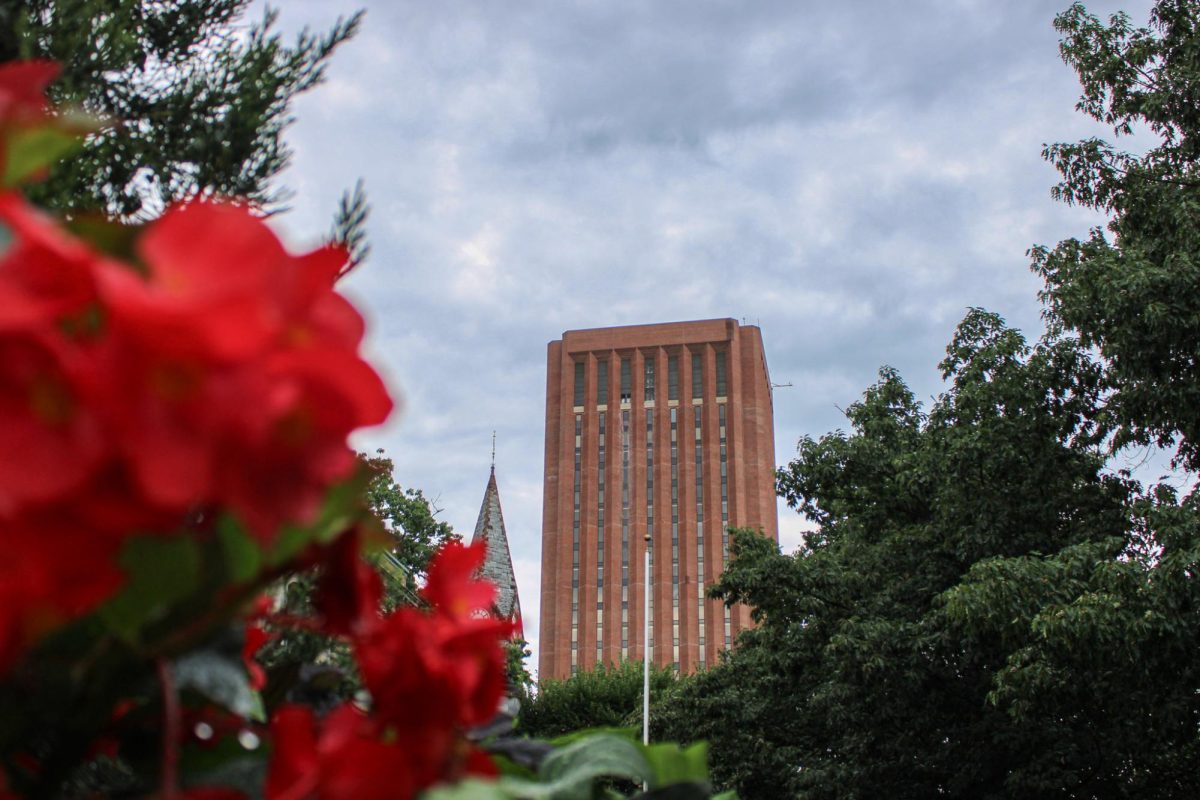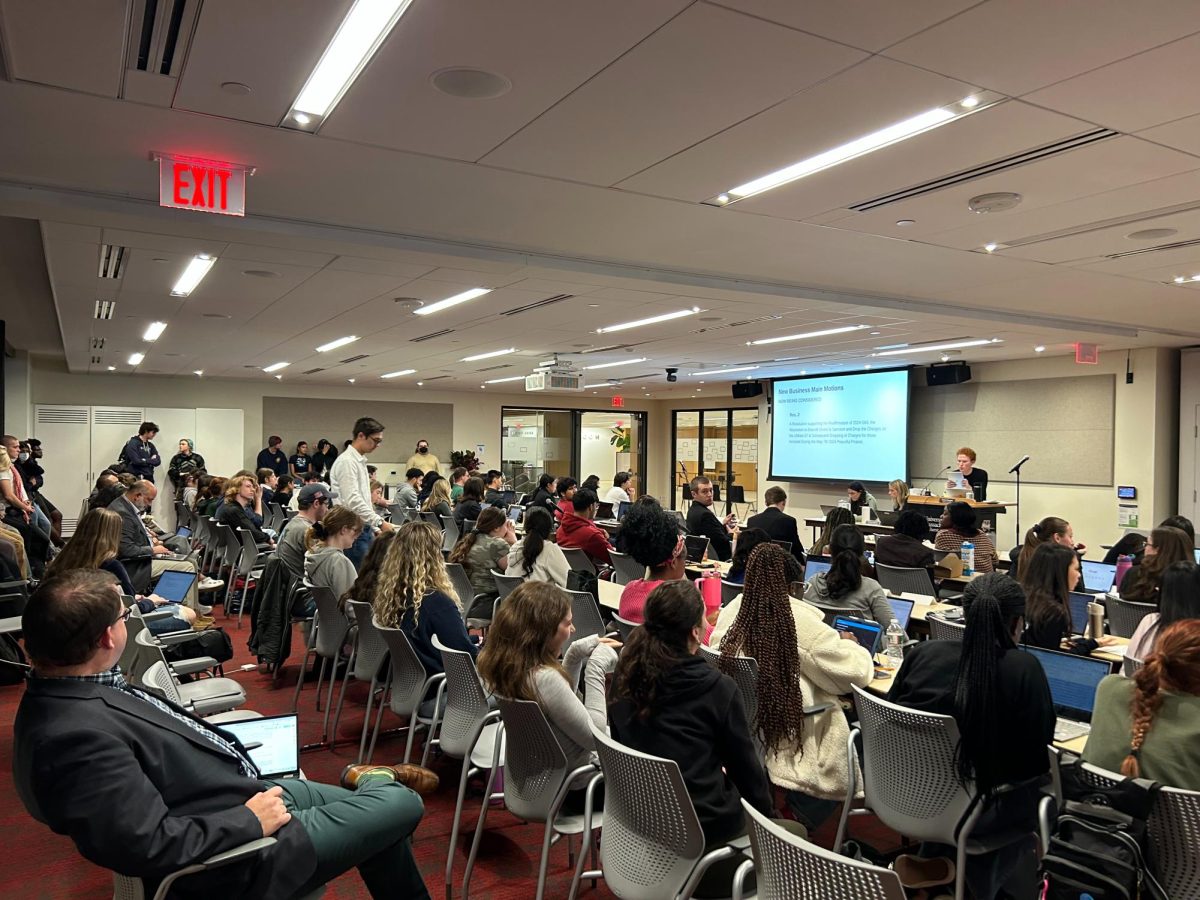On Oct. 11, Students for Justice in Palestine (SJP) and Interlink Publishing co-hosted “Israel, Palestine, and the Claims of Belonging: A Conversation of Jews and Palestinians” at the University of Massachusetts.
Around 85 people attended the event, which featured a panel discussion with three authors who wrote books on the Israel-Palestinian conflict.
SJP shared the event on its Instagram following the Hamas attack on Israel on Oct. 7. This was followed by Israel’s retaliation on the Gaza Strip. The Hamas attack and subsequent Israeli siege has claimed the lives of at least 1,400 Israelis and 2,800 Gazans thus far, adding to the longstanding Israel-Palestine conflict.
Michel Moushabeck, founder and editor of Interlink Publishing, addressed these recent events.
“For all Jews and Palestinians who equally care, the only way to end the cycle of violence is freedom and equality for all, from the river to the sea,” Moushabeck said.
Moushabeck then introduced moderator Josh Bernstein, who worked under the Freedom Theater from the Jenin Refugee camp in the West Bank for 15 years, and the authors on the panel.
Author Linda Dittmar’s book, “Tracing Homelands: Israel, Palestine, and the Claims of Belonging,” covers her four-year search across Israel to locate the ruins of Palestinian villages. Born in 1939, Dittmar grew up in what was then Mandatory Palestine, and became familiar with the horrors of both the Holocaust and the Nakba, the mass displacement of Palestinians during the 1948 Arab-Israeli war.
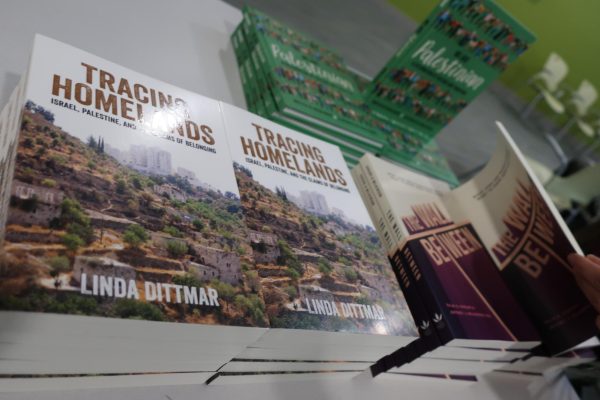
She described being “deeply inculcated” into Zionist ideology from an early age. “The feelings I have are a mix of shame and rage,” Dittmar said.
Following Dittmar, Authors Jeffrey J. Wilkinson and Raja G. Khouri introduced their book, “The Wall Between: What Jews and Palestinians Don’t Want to Know About Each Other.”
Wilkinson is an American Jew involved in trauma healing and the Israel-Palestine conflict. Khouri is a Palestinian-Canadian and founder of Khouri Conversations, a non-profit advocacy and human rights venture.
Their book examines the “metanarratives” of Jews and Palestinians and how they were created through trauma responses, identity crises and victimizations. Khouri outlined how the book seeks to illustrate the influence of historical traumas on present behavior.
“We call this the metanarratives; for Jews the metanarrative is the Holocaust and to Palestinians, it’s the Nakba,” Khouri said.
Wilkinson and Khouri read two paragraphs from their book that focused on the different metanarratives Palestinians have from Jews when it comes to antisemitism, where for the former it is a “muzzle” while for the latter it harms their identity.
Bernstein advised the audience: “Go deeply in your own research. If you hear a story, be skeptical.”
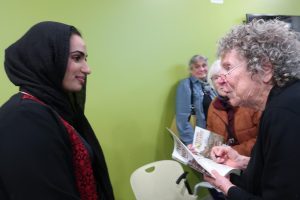
“Trauma and wound is not Jewish or Palestinian,” Wilkinson explained. “It is a human condition to suffer. And it’s also a human condition to heal and come together.”
Khouri noted that sixteen years ago he investigated hate crimes on a committee for the Ontario government. He felt cautious at first towards two Jewish colleagues who were advocates for Israel in addition to Jewish rights.
However, by the end of the committee, they taught him that Zionism meant self-determination for Jewish people, and he shared that Zionism meant a force which took everything from him, to give to them. “You learn from people who you disagree with.”
He added that recent events made it more difficult for him to tell Palestinians and Jews that they need to understand each other’s narratives better, but “there is no other way if we are to find a way to coexist not just over there, but over here.”
Khouri reiterated a joint statement he and Wilkinson gave in response to the recent attacks.
“Violence needs to be condemned. All violence,” Khouri said. “Of course, we all know that violence did not start on Saturday.”
Bernstein asked the panelists to describe specific outreach strategies which had worked in fostering understanding, as well as red flags to look out for.
Wilkinson said plainly: “you can’t convince people.” He begins by asking “What do we have in common? What do we agree on?”
In his experience, for Jews, “most of the time, their deep connection to Israel is about safety, is about fear of more persecution after two thousand years of persecution.”
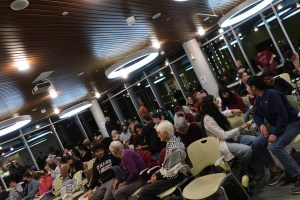
Khouri noted that trauma is not all in the past. “I know as a Palestinian, that when I see something happening, I don’t not necessarily think of the Nakba, and I think of the ongoing-ness of the oppression of the Palestinians,” he said.
He mentioned how lobby groups “take this trauma and manipulate it, to keep us in our places.”
“To keep us remembering why we are afraid. To keep us away from the other narrative, in fear of the other, and that works for them, but it really doesn’t work for us because it victimizes us,” Khouri said.
Dittmar honed in on a different obstacle to understanding. She described a “nationalist arrogance” among Israelis which she differentiated from the fear of antisemitism experienced by American diaspora Jews.
“Israelis are not afraid of antisemitism.” she said. “That’s not their issue. The issue is that there is a tremendous use of muscle in Israel to silence criticism.”
Israel covers up signs of the Nakba in systematic ways, Dittmar said, such as planting forests over Palestinian villages.
“Israel is dealing with [a] tremendous amount of guilt that is covered up with tremendous bravado, essentially,” she added.
Dittmar recommended the documentary Tantura, which chronicles the difficulty of acknowledging a massacre. The problem for Dittmar with “attentive and caring listening” is that the Israeli public “has a lot to gain from staying as they are and not changing.”
Bernstein’s next question was regarding Israel’s “right to self-defense.” “Why don’t Palestinians have the right to defend themselves…why isn’t the same acceptance given to them?”
Wilkinson was the first to answer and said that “tropes are easy,” explaining that people tend to follow a certain ideology. He added that it’s important to question these tropes and what we know.
The existence of Palestinians itself, he said, was a “threat” to Israel, but to Palestinians, their existence is “proof that they’re still breathing.”
Khouri focused on three main reasons for the West’s unequivocal support of Israel: the country is a “geostrategic ally,” Israelis are “like [them],” in relation to western democracy and that there are lobbying groups in the West.
These reasons “don’t have anything to do with justice, human rights, or some kind of consideration of the Palestinian people,” Khouri said.
In relation to self-determination, Dittmar explained that while there is a legal aspect, there is also an “ethnic or communal” aspect that became an “engine of self-determination and fighting.”
Dittmar referenced Croatia’s independence and India’s partition and believes that the more emotional aspect of self-determination trails back to various historical points, such as the first book published in Hebrew and the collapse of the Ottoman empire.
After the discussion, the conversation opened to questions from the audience.
Shriyaa Chittibabu, a finance and economics junior at UMass, asked Wilkinson if he thought that Palestinians should resist differently. “What are Palestinians supposed to further give up?”
Wilkinson responded that he would not ask them to give up anything.
“I don’t have a comment about how a group resists their oppression,” he said. “My freedom, my release came at his [Khouri’s] expense … and I can’t live with that.”
Ruya Hazeyen, SJP co-president, called the discussion “very idealistic.” She asked how Palestinian students were meant to have “peaceful conversation” with campus Zionists, “who are doxxing us, who are sending us death threats, who are actively threatening our lives, literally.”
She then asked the panelists, whom she recalled condemning “all violence,” how they could conflate all forms of violence, and then go on to tell Palestinians “of course you should resist.”
Dittmar responded that the usefulness of the nonviolent Palestinian Boycott, Divest, Sanctions movement, which she called “a very good idea,” could be seen in the Israeli response.
“When you see the level of hasbara [‘explaining’ in Hebrew], or Israeli propaganda and repression of speech that’s going on, clearly the Israelis are afraid of that,” said Dittmar.
Hazeyen pointed out that during the 2018 Great March of Return, peaceful Palestinian protesters were shot and killed by Israeli soldiers. “This is a fight for liberation,” Hazeyen said. “I understand that you all are sympathetic to the cause, but dialogue is not what is going to free Palestine.”
“There was some content of this presentation that we as SJP do not agree with,” Maysoun Batley, a member of SJP, said. “We believe in freedom by any means necessary [and] we support the Palestinian resistance with absolutely everything we have,” she added.
Dittmar ascribed Israeli treatment of Palestinians to the psychological idea that “somebody was abused and then abuses the next generation.” Both the Israeli and diasporic communities, she said, “need to find other forms of self-respect.” She recognized the efforts of Jewish and Israeli groups “that are doing their best to confront history in a more honest way.”
A student named Hiba posed the final question: “People in Palestine [have] been oppressed and the way they acted, and reacted, is like, hundred percent self-defense. It’s not violence, it’s not terrorism.” She asked the panel if this position was where they stood, and how to explain it to those who oppose Palestinian resistance.
Khouri said of the civilian killings reported on Saturday: “This is wrong. Does Israel do that? Yes, it does that too. Both are wrong.”
Closing remarks
In response to Hiba’s question, Wilkinson said: “We reject how the word terrorism is employed.” Of the idea “that these certain events by a resistance group are called terrorism, and F-15s bombing buildings is not,” he said, “we reject that paradigm one hundred percent.”
“I know there’s a lot of pain in the room, there’s a lot of anger in the room, and I’m not asking you to do anything; I’m only asking you for the privilege and the opportunity to create some moment of healing, to have you know that I deeply grieve the losses that people are experiencing, I deeply grieve the anger that primarily my community is taking out on Palestinians who are resisting,” Wilkinson said. “I feel a great sense of anger and sorrow about that.”
Khouri blamed world leaders such as Biden and Trudeau, as well as organizations like the EU, for their lopsided view of the conflict.
“Two very bad things are happening at the same time. The West chooses to reject one and accept the other,” Khouri said.
Dittmar remarked that she was horrified by the need of the people of Gaza and Hamas specifically to “explode the way they have.” She was “very grateful” to everyone attending for “really thinking and paying attention to what is being said.”
“You give me hope for the future,” Dittmar said. “You are the future, really.”
Alexandra Rowe can be reached at [email protected]. Mahidhar Sai Lakkavaram can be reached at [email protected] and followed on X @Mahidhar_sl.

